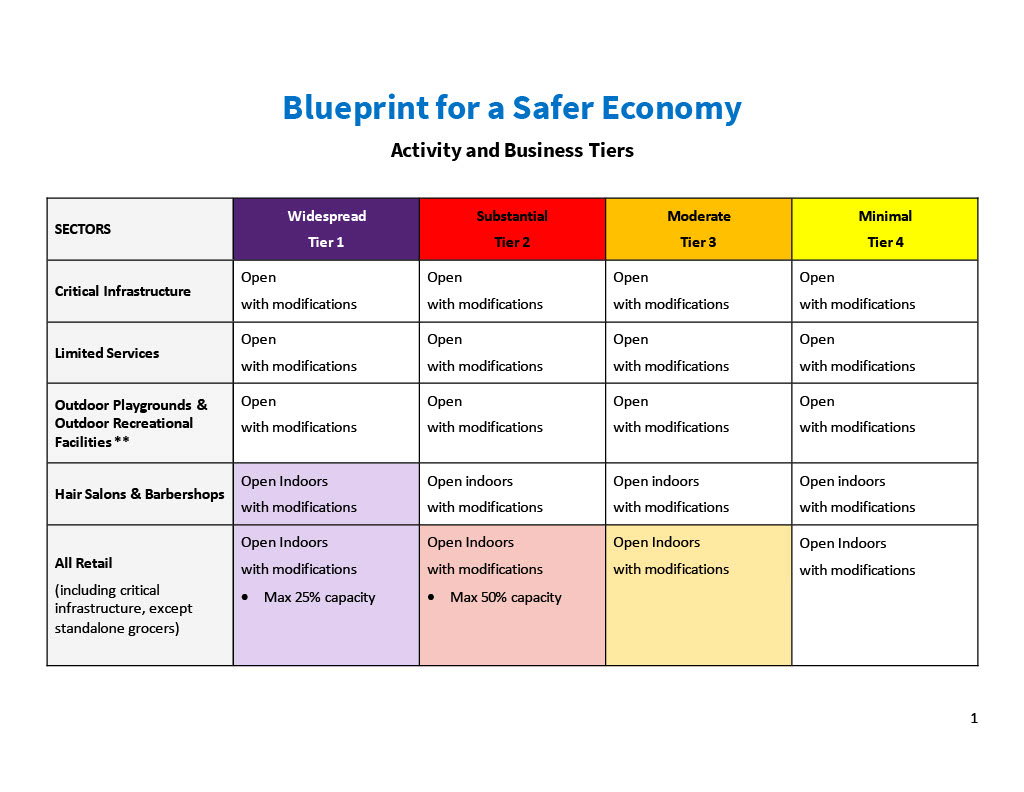COVID-19: Orange County Moves Back Into Purple Tier
SACRAMENTO – As COVID-19 cases sharply increase across the country and California, Governor Gavin Newsom and state public health officials announced immediate actions today to slow the spread of the virus. The state is pulling an emergency brake in the Blueprint for a Safer Economy resulting in 94.1 percent of California’s population in the most restrictive tier. This change is effective tomorrow. The state will reassess data continuously and move more counties back if necessary. California is also strengthening its face covering guidance to require individuals to wear a mask whenever outside their home, with limited exceptions.
“We are sounding the alarm,” said Governor Newsom. “California is experiencing the fastest increase in cases we have seen yet –faster than what we experienced at the outset of the pandemic or even this summer. The spread of COVID-19, if left unchecked, could quickly overwhelm our health care system and lead to catastrophic outcomes. That is why we are pulling an emergency brake in the Blueprint for a Safer Economy. Now is the time to do all we can – government at all levels and Californians across the state – to flatten the curve again as we have done before.”
The rate of growth in confirmed COVID-19 cases is faster than it was in July, which led to a significant peak in cases. This requires a swift public health response and action from all Californians to slow the spread of the virus. Immediate action will help protect individuals at higher risk of severe illness or death from COVID-19 and will help keep the state’s health care delivery system from becoming overwhelmed.
“The data we are seeing is very concerning. We are in the midst of a surge, and time is of the essence. Every day matters and every decision matters,” said California Health and Human Services Secretary Dr. Mark Ghaly. “Personal decisions are critical, and I am I imploring every Californian to stay home if they can, wear a mask whenever they leave their homes, limit mixing, practice physical distancing and wash their hands.”
The 28 counties moving back into Tier 1(Purple/Widespread) include:
| Alameda | Napa | Santa Cruz |
| Butte | Nevada | Siskiyou |
| Contra Costa | Orange | Solano |
| El Dorado | Placer | Sutter |
| Fresno | San Benito | Trinity |
| Glenn | San Joaquin | Tuolumne |
| Kern | San Luis Obispo | Ventura |
| Kings
Mendocino Merced |
Santa Barbara
Santa Clara |
Yolo
Yuba |
The nine counties moving back into Tier 2 (Red/Substantial) include:
| Colusa | Marin | Plumas |
| Del Norte | Modoc | San Francisco |
| Humboldt | Mono | San Mateo |
The two counties moving back into Tier 3 (Orange/Moderate) include:
| Calaveras | Sierra |
Today’s action will remain in effect until the State Public Health Officer determines it is appropriate to make modifications based on public health conditions and data.California has taken steps to prepare the state for an increase in COVID-19 cases. The state has developed additional testing capacity to allow cases to be quickly identified, recently opening a new laboratory in Valencia that is already processing thousands of tests a day. The state is averaging 164,345 tests over the last seven days.
The state has been working in partnership with hospitals, clinics and physicians on the COVID-19 response. To support California’s health care delivery system, the state has an additional 1,872 beds available at alternate care sites outside of the system that can be made available quickly if needed to respond to a surge in cases.
California will continue to update the Blueprint for a Safer Economy based on the best available public health data and science. For more information about the Blueprint and what Californians can do to prevent the spread of COVID-19, visit covid19.ca.gov.








